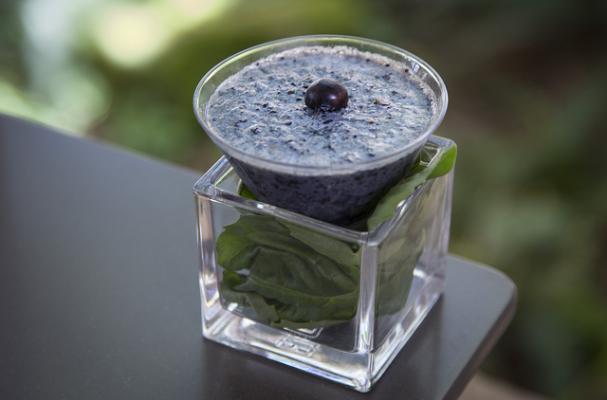
Because cows are a high-carbon producing animal, using non-dairy alternatives can have a big impact on our environment. Cows produce methane, a greenhouse gas that is accelerating climate change even faster than CO2 – and the Midwest drought has also driven up the price of grains needed to feed cows. Today is Earth Day and we're featuring some delicious low carbon footprint recipes from Bon Appétit Management Company (food services for a sustainable future®). This delicious smoothie recipe uses almond milk from California almonds, one of the few perennial crops that are likely to experience slight yield increases as a result of climate change’s rising temperatures. Berries flash-frozen at the peak of ripeness replace fresh ones when local fruit isn’t available, retaining all of their flavor and nutrients. Try this tasty and healthy smoothie in celebration of Earth Day and the 6th annual Low Carbon Diet Day!
Blueberry, Basil and Almond Milk Smoothie
1 10-ounce serving
1/2 cup frozen blueberries
2 medium basil leaves
3/4 cup almond milk
1/4 cup ice
1 teaspoon honey (optional)
Combine all ingredients in a blender and blend until smooth. Top with blueberry basil leaf garnish.
EatLowCarbon.org is a great resource for learning how to reduce your carbon footprint, with diet tips, carbon food scores and a quiz on planet-friendly foods.
Image Sources:











Comments
July 1, 2013
how do you think the fruits and veggies grow??? CARBON. we are at an all time low vegetation is dying cause thats what they breath. please wake up, research and don't make statements that make you sound completely ignorant.
July 1, 2013
@renegadenic not sure what you mean. Plants consume carbon dioxide and convert it into cellulose, sucrose, fatty acids and other plant materials through photosynthesis. They also release oxygen. The problem isn't a lack of carbon in the environment (air) it's a surplus. As we burn fossil fuels that were originally created through photosynthesis over millions of years, we're increasing the carbon dioxide levels in the atmosphere, which traps heat more efficiently than other elements (e.g. nitrogren and oxygen) in the air. The point of this article is that plant-based milk alternatives use far less fossil fuels to produce. When you consider all of the energy required to feed and support cows, the difference is huge. Further, cows also naturally produce methane, which is also powerful heat trapping gas.